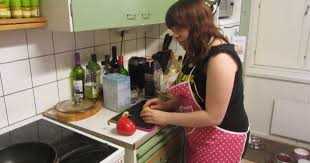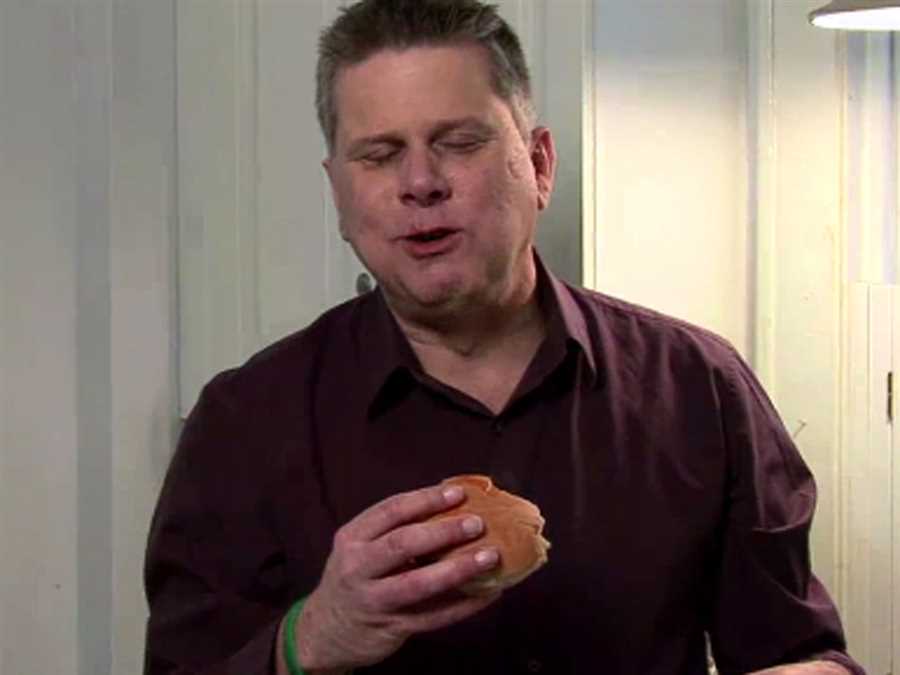







Blind people cooking may seem like an impossible task at first glance. After all, how can someone navigate the kitchen, find the ingredients, and prepare a meal without the ability to see?
However, cooking is not solely reliant on sight. It is a multi-sensory experience that involves the use of touch, taste, smell, and sound. Blind people have remarkable skills in these areas, which enable them to overcome the challenges of cooking without vision.
Blind individuals develop their own techniques and strategies to cook independently. They rely on their sense of touch and memory to identify ingredients, measure quantities, and prepare the necessary utensils. They often use tactile markers and braille labels to differentiate between spices, condiments, and other kitchen essentials.
Blind people also rely on their heightened senses of taste and smell to assess the flavors and doneness of the food they are preparing. They might use timers, auditory cues, and temperature probes to ensure that the cooking process is on track.
Moreover, blind individuals receive training in specialized cooking techniques. They can learn to chop vegetables by utilizing hand positions and feeling for the desired consistency. They can pour liquids into containers by feeling the liquid rise or by using pouring guides. Through practice and experience, blind individuals can become proficient and creative cooks.
In conclusion, blindness does not restrict a person’s ability to cook. With their sharpened senses and adaptive techniques, blind individuals can prepare delicious and nutritious meals, bringing joy and nourishment to themselves and their loved ones.
Blind People’s Cooking Skills

It is a common misconception that blind people cannot cook. However, this is far from the truth. Blind individuals possess excellent culinary skills and can create delicious meals just like their sighted counterparts.
Blind people have developed unique strategies and techniques to navigate the kitchen safely and efficiently. They rely on their sense of touch, hearing, and smell to accomplish various tasks. For example, they use braille labels and tactile markings on kitchen appliances to identify different items and controls.
Blind individuals are often highly organized in the kitchen. They have designated places for ingredients, utensils, and equipment so that everything is easily accessible. They may use tools such as talking kitchen scales and measuring cups with raised markings to accurately measure ingredients.
Furthermore, blind people can chop, slice, and dice ingredients with precision. They use specialized cutting techniques like the “claw” grip to protect their fingers while slicing. Some may use assistive devices like cutting guides or talking thermometers to ensure precise cooking temperatures.
In addition, blind people utilize their other senses to gauge the readiness of food. They rely on the sound and smell of sizzling, boiling, or simmering to determine if the food is cooked properly. They also use taste testing and texture evaluation to ensure the desired outcome.
Blind individuals can even follow complex recipes by using assistive technology like screen readers or braille displays. These tools read out or display the recipe step-by-step, allowing them to follow along and execute each instruction accurately.
Overall, blind people possess remarkable cooking skills that enable them to prepare delicious meals independently. With their creativity, adaptability, and determination, they continue to defy stereotypes and inspire others in the culinary world.
Overcoming challenges in the kitchen
Cooking can be a challenging task, even for those who have perfect vision. For blind individuals, it can seem like an impossible feat, but with the right techniques and tools, blind people can successfully cook and create delicious meals in the kitchen.
Adapted tools and equipment
One of the main challenges for blind people in the kitchen is identifying and using kitchen tools and equipment. However, there are adapted tools available that can help with this. For example, tactile measurement cups and spoons have raised markings so that blind individuals can accurately measure ingredients. Braille-labeled kitchen utensils and appliances can also be used to help with identification.
Additionally, talking kitchen timers and appliances with voice-activated controls can also be useful. These devices can provide verbal feedback and instructions, making it easier for blind people to navigate the kitchen and avoid potential dangers.
Organizational strategies
Organization is key when it comes to cooking, and it is especially important for blind individuals in the kitchen. Developing organizational strategies can help blind people stay on top of their cooking process and manage multiple ingredients simultaneously.
Using tactile labels or rubber bands to differentiate between similar items, such as spices or condiments, can be helpful. Grouping ingredients by type or meal can also make it easier to locate and access what is needed during the cooking process.
Creating a clear and consistent workflow is another effective strategy. Breaking down the cooking process into smaller, manageable steps can help blind individuals stay organized and ensure that they do not miss any important ingredients or steps.
Accessible recipes

Another challenge blind individuals face when cooking is accessing and understanding recipes. However, with advancements in technology, there are now accessible methods for blind people to access and use recipes.
Many recipe websites and apps offer screen reader compatibility, allowing blind individuals to access and navigate recipes using text-to-speech software. Braille and large-print recipe books are also available, providing alternative options for accessing cooking instructions.
Overall, while cooking may present unique challenges for blind individuals, there are various techniques, tools, and resources available to help them overcome these obstacles. With determination and the right support, blind people can successfully navigate the kitchen and enjoy the art of cooking.
Question-answer
Can blind people cook?
Yes, blind people can cook. Despite their inability to see, blind individuals can rely on their other senses to navigate the kitchen and prepare meals. With the help of adaptive equipment and techniques, blind people can successfully cook and enjoy the process of creating delicious dishes.
Is it safe for blind people to cook?
Yes, it is safe for blind people to cook. Although certain challenges may exist, blind individuals can take safety precautions and use adapted techniques to ensure their well-being in the kitchen. By practicing good organization, using protective measures like oven mitts, and being mindful of potential hazards, blind people can cook safely.
What adaptive equipment can blind people use for cooking?
Blind people can use a range of adaptive equipment for cooking. Some examples include talking kitchen scales, tactile measuring cups and spoons, braille-labeled appliances, and talking thermometers. These tools allow blind individuals to accurately measure ingredients, monitor cooking temperatures, and use appliances with ease.
What techniques can blind people use to cook?
Blind people can utilize various techniques to cook. They can rely on their sense of touch to identify ingredients, measure quantities, and test the doneness of food. They can also use auditory cues to determine cooking times and temperatures. Additionally, blind individuals can improve their skills through cooking classes and tutorials specifically designed for visually impaired individuals.
Are there any blind chefs?
Yes, there are blind chefs who excel in the culinary world. Blind individuals have proven their talent and passion for cooking by becoming professional chefs and even participating in cooking competitions. Their determination, adaptability, and mastery of culinary skills showcase that blindness is not a barrier to pursuing a successful career in the culinary field.
Can blind people cook?
Blind people can certainly cook! With proper training, adaptive techniques, and accessible tools, blind individuals can prepare meals just like anyone else.
What kind of training do blind individuals need to cook?
Blind individuals can benefit from training that teaches them how to use their other senses, such as touch and hearing, to navigate the kitchen and work with ingredients. They also learn techniques like measuring ingredients by touch and using adaptive tools.







